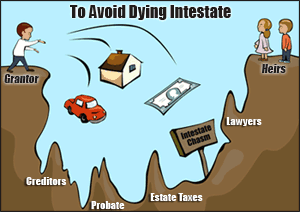Florida Intestacy Laws: Quick Reference Guide

If you die without a will in Florida, your assets will go to your closest relatives under state “intestate succession” laws. While a last will and testament serves as your individual instructions to the probate court, intestate rules are the gap fillers or default rules. In other words if your will is silent to an area or you have no will these are the rules that the Court will utilize.
What is subject to intestate succession laws ? Only property that would have passed through your will, property owned in your own name, alone. So many assets will not be subject to intestate succession such as:
- Property transferred through a living trust
- Life insurance proceeds (since you name a beneficiary)
- Funds in an IRA, 401(k), or other retirement account
- Securities held in a transfer upon death account
- Payable on death accounts and
- Property you own with someone else in joint tenancy or tenancy by the entirety.
Joint tenancy means that when one of the co owners dies the other person inherits the entire property. Tenancy by the entirety means that each co owner (who must be spouses) have an equal and undivided interest in the property.
Under intestate succession, who gets what depends on whether or not you have living children, parents, or other close relatives when you die.
- If you have children but no spouse à the children inherit everything
- If you have a spouse but no children à the spouse inherits everything
- If you have a spouse, children (from you and the spouse and the spouse has no other children à the spouse inherits everything
- If you have a spouse and descendants from you and that spouse, and the spouse has descendants from another relationship à your assets will be divided between your spouse and descendants equally
- If you have a spouse and descendants from you and someone other than that spouse à your assets will be divided between your spouse and descendants equally
- If you have parents but no spouse or descendants à your parents inherit everything
- If you have siblings but no spouse, descendants or parents à your siblings inherit everything
Each heir’s share will be based on the size of your assets and the number of heirs. Here are some other terms used in Florida intestate succession law you may not be familiar with.
- Half-relatives. “Half” relatives inherit as if they were “whole.” That is, your sister with whom you share a father, but not a mother, has the same right to your property as she would if you had both parents in common.
- Posthumous relatives. Relatives conceived before — but born after — you die inherit as if they had been born while you were alive.
- Immigration status. Relatives entitled to an intestate share of your property will inherit whether or not they are citizens or legally in the United States.
Want to learn more? Want to avoid having your estate probated through the rules of intestancy? Check out our FAQ video library here: http://www.pankauskilawfirm.com/